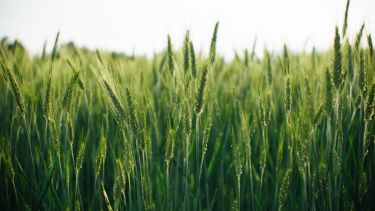- Researchers from the University of ∫˘¬´”∞“µ and ZSL‚Äôs Institute of Zoology have revealed the cost of the herbicidal resistance of the agricultural weed black-grass
- Black-grass decimates winter wheat farms, the UK’s main cereal crop
- The widespread use of herbicides leading to resistant black-grass is costing UK millions in profit
The resistance of a major agricultural weed to herbicides costs the UK economy ¬£400 million per year, according to scientists from the University of ∫˘¬´”∞“µ and conservation charity the Zoological Society of London (ZSL).
The study marks the first time experts have put an economic figure on the herbicidal resistance of black-grass, which is decimating winter wheat farms across the UK – putting at risk a vital ingredient in Christmas treats such as mince pies, biscuits and cakes – and a major feed crop for turkeys.
Black-grass is a native annual weed which, although natural, can with large infestations force farmers to abandon winter wheat, the UK’s main cereal crop. Farmers have been using herbicides to try and tackle the problem, but in many areas of England the black-grass is now resistant to these herbicides.
The cost of black-grass, heralded as Western Europe’s most economically significant weed, is setting back the UK economy £400 million and 800,000 tonnes of lost wheat yield per year, with potential implications for national food security.
Published in Nature Sustainability today (23 December 2019), researchers from the University of ∫˘¬´”∞“µ, ZSL‚Äôs Institute of Zoology and Rothamsted University have devised a new model which helps quantify the economic costs of the resistant weed and its impact on yield under various farming scenarios.
This research underlines the enormous costs that are incurred by farmers as a consequence of herbicide resistance.
Professor Robert Freckleton
Institute for Sustainable Food
An estimated four million tonnes of herbicides are applied to crops worldwide each year. There are 253 known herbicide-resistant weeds already, and unlike the known costs to the economy of human antibiotic resistance, estimates of the costs of resistance to agricultural chemicals are severely lacking.
Over-use of herbicides causes loss of wild plant diversity, damages insects and wildlife, and can lead to poor water quality.
Professor Robert Freckleton, from the Institute for Sustainable Food at the University of ∫˘¬´”∞“µ, said: ‚ÄúThis research underlines the enormous costs that are incurred by farmers as a consequence of herbicide resistance.
“Because there are few alternatives to the current range of herbicides, evolved resistance is only going to become more of a problem. This means that some crops will be uneconomical to grow in the future.”
The research found the UK is losing 820,000 tonnes in wheat yield each year, roughly five per cent of the UK’s domestic wheat consumption, due to black-grass. If all fields were to contain large amounts of resistant black-grass, it is estimated this would result in an annual cost of £1 billion, with a wheat yield loss of 3.4 million tonnes per year.
Lead author and postdoctoral researcher at ZSL’s Institute of Zoology, Dr Alexa Varah said: “This study represents the first national-scale estimate of the economic costs and yield losses due to herbicide resistance, and the figure is shockingly higher than I think most would imagine.
“We need to reduce pesticide use nationwide, which might mean introducing statutory limits on pesticide use, or support to farmers to encourage reduced use and adoption of alternative management strategies. Allocating public money for independent farm advisory services and research and development could help too.”
Management industry recommendations have so far advised using a mixture of herbicides, designed to prevent the evolution of specialist resistance, however recent research has revealed that this method actually leads to a more generalist resistance – and in some cases creates resistance to chemicals the plants have never been exposed to.
Glyphosate is now one of the few herbicides that black-grass has not evolved resistance to, with farmers now reliant on repeated applications to control the weed. However, evidence from a recent study shows that resistance to glyphosate is now evolving in the field too.
The Institute for Sustainable Food at the University of ∫˘¬´”∞“µ brings together multidisciplinary expertise and world-class research facilities to help achieve food security and protect the natural resources we all depend on.

